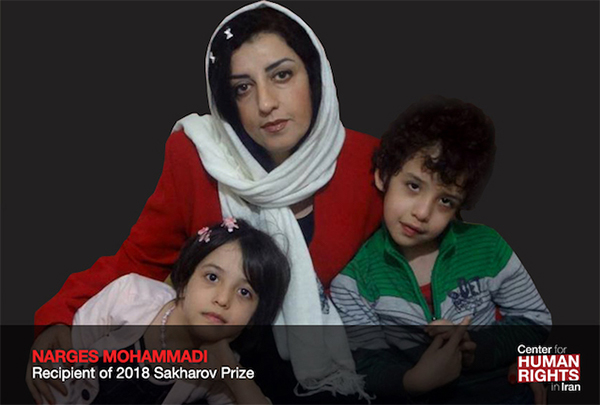 April 15, 2018 — Prisoner of conscience Narges Mohammadi was unable to accept the 2018 Andrei Sakharov Prize in person in Columbus, Ohio where the American Physical Society (APS) awarded it to her but she sent a message of hope and strength in a powerful speech.
April 15, 2018 — Prisoner of conscience Narges Mohammadi was unable to accept the 2018 Andrei Sakharov Prize in person in Columbus, Ohio where the American Physical Society (APS) awarded it to her but she sent a message of hope and strength in a powerful speech.
“The path to democracy in Iran lies not through violence, war, or military action by a foreign government, but through organizing and strengthening civil society institutions. The government knows this only too well,” said Mohammadi in a speech obtained by the Center for Human Rights in Iran (CHRI) that will be read on April 16, 2018, by Iranian American academic Nayereh Tohidi, who accepted the award on Mohammadi’s behalf.
“Sitting here in the prison, I am humbled by the honor you have bestowed on me and I will continue my efforts until we achieve peace, tolerance for a plurality of views, and human rights,” added Mohammadi, who is serving a 16-year prison sentence in Tehran’s Evin Prison.
Mohammadi, 45, has a physics degree from Iran’s Imam Khomeini University. In 2009, she was dismissed from her job as an engineer with the Iran Engineering Inspection Corporation and imprisoned due to her public advocacy of women’s and human rights.
Her husband, political activist Taghi Rahmani, lives with their two children Ali and Kiana in France. In July 2016, Mohammadi had to go on hunger strike to force the authorities to allow her to speak to them on the phone.
The last time Mohammadi’s children were able to visit her was June 2015.
“Even the walls of Evin Prison have not been able to stop Narges Mohammadi from being a leading defender of women’s and human rights in Iran,” said Hadi Ghaemi, executive director of CHRI, a physicist who attended the award ceremony in Columbus.
Mohammadi was first arrested in 2009 and sentenced to 11 years in prison for the charges of “assembly and collusion against national security,” “membership in the Defenders of Human Rights Center,” and “propaganda against the state.”
Upon appeal, her sentence was reduced to six years and she was released from Zanjan Prison in 2013 on medical grounds.
She was arrested again on May 5, 2015, two months after meeting with Catherine Ashton, the European Union’s foreign policy chief at the time, at the Austrian Embassy in Tehran to discuss the situation of human rights in Iran.
In September 2016, Branch 26 of the Tehran Appeals Court upheld a 16-year prison sentence for Mohammadi, again for the charges of “membership in the [now banned] Defenders of Human Rights Center,” “assembly and collusion against national security” and “propaganda against the state.”
She will be eligible for release after serving 10 years in prison.
Named after Russian scientist and dissident Andrei Sakharov, the Sakharov Prize was launched by the APS in 2006 to honor outstanding leadership and the achievements of scientists in upholding human rights. In 2018 it was also awarded to Indian researcher Ravi Kuchimanchi and in 2014 to Iranian experimental laser physicist Omid Kokabee.
“Narges Mohammadi has paid a heavy price for her peaceful activism and yet she has persisted as a courageous role model for generations of younger activists,” said Ghaemi.
—
Following is the full text of Narges Mohammadi’s acceptance speech that will be read on April 16, 2018, by Professor Nayereh Tohidi of California State University at the APS’ April Meeting in Columbus, Ohio.
In the last 25 years, I have been active in eleven civil society organizations, either as a member or as a founding member. Now, with great regret, I see the doors of these organization being closed and sealed by the government. Yet I am not hopeless nor have I lost my motivation. We cannot stop trying. I still hope and deeply believe that the tireless efforts of our civil society activists will eventually bear fruit. I am awaiting the moment I can rejoin my colleagues in these activities once I am released. The path to democracy in Iran lies not through violence, war, or military action by a foreign government, but through organizing and strengthening civil society institutions. The government knows this only too well. It is fearful of non-governmental civil society organizations precisely because of its undemocratic nature. It cannot even tolerate unions such as Association of Iranian Journalists, or human rights organizations such as the Center for Defenders of Human Rights, or charity bodies like the Association in Support of Working Children.
As a human rights defender, like millions of Iranians, I hate the death penalty; I despise discrimination and injustice against women; I protest against the imprisonment and torture of political and civil rights activists in solitary confinement; and I will not be silent in the face of human rights violations. In order to institutionalize human rights and achieve peace between the people and the state, I shall endure my deprivation of freedom and rights, even though separation from my children is nothing less than death for me. I am a woman and a mother, and with all my feminine and maternal sensibilities, I seek a world free from violence and injustice, even if I have suffered injustice and violence tens of times.
Thoughts and dreams don’t die. Belief in freedom and justice does not perish with imprisonment, torture or even death and tyranny do not prevail over freedom, even when they rely on the power of the state. Sitting here in the prison, I am deeply humbled by the honor you have bestowed on me and I will continue my efforts until we achieve peace, tolerance for a plurality of views, and human rights.
For interviews, contact:
Hadi Ghaemi
+1-917-669-5996
hadighaemi@iranhumanrights.org
Visit our website: www.iranhumanrights.org
